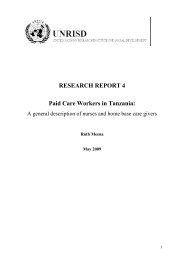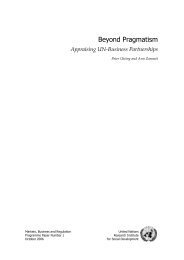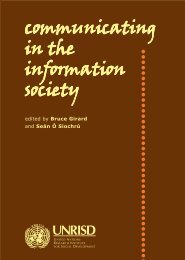Women's Employment - United Nations Research Institute for Social ...
Women's Employment - United Nations Research Institute for Social ...
Women's Employment - United Nations Research Institute for Social ...
You also want an ePaper? Increase the reach of your titles
YUMPU automatically turns print PDFs into web optimized ePapers that Google loves.
Gender and employment in Moroccan textile industries<br />
and weavers. Similarly, women workers distinguish between the<br />
authority of the assembly line heads and that of the workshop head.<br />
The <strong>for</strong>mer are closer to the women workers and they themselves<br />
work on the sewing machines, their authority being limited to<br />
checking the production process on the assembly line, whereas the<br />
workshop head, who is usually a man, is responsible <strong>for</strong> the<br />
production and behaviour of the workers. He is the confidential agent<br />
of the factory head whose power is relayed through him and he<br />
sometimes abuses it.<br />
I don’t like the head of the workshop, I can’t describe him. The trouble<br />
is he is incompetent. He doesn’t know the work, he doesn’t know<br />
how to cut. He knows nothing. He only knows how to insult people<br />
<strong>for</strong> the slightest reason and sometimes <strong>for</strong> no reason at all. (Woman<br />
worker in a garment factory)<br />
The <strong>for</strong>eman does what he wants. He treats certain women well and<br />
others badly. There are girls whom he considers serious and their<br />
work good and he treats them with respect. He goes after other ones<br />
and if they do not play the game he loses his temper with them (shad<br />
maaha dad). He looks after the one who is his girlfriend and gives<br />
her good work to do. (Woman worker in a carpet factory)<br />
In the carpet sector, the maalma has more authority over the<br />
weavers than the heads of the assembly line have over the stitchers.<br />
She has the power of recruiting and is thus always able to keep the<br />
weavers indebted to her. Nevertheless she does not escape the<br />
authority of the workshop head, as he can, if the quality of production<br />
does not con<strong>for</strong>m to fixed standards, destroy her whole day’s<br />
production and make her start again.<br />
Does the behaviour of the women workers justify such patterns<br />
of authority and control? On what is this system of management<br />
based? Authority is used to ensure discipline and the functioning of<br />
the production process. For example, it is sometimes used to control<br />
the chatting of the young women workers making garments, as this<br />
upsets production. This is an example of the tension between cultural<br />
norms and the exigencies of the factory. The workers want to gossip<br />
while they work. This is part of Moroccan culture, as attested by the<br />
popular saying “spinning talk and task” (hdith wa moughzel): one can<br />
both chat and spin wool. To counteract this behaviour, some workshop<br />
heads control chatting by transmitting music and putting up the<br />
volume when necessary.<br />
The workplace authority systems were perceived by the workers<br />
as excessive. Women workers recount the insults that they have<br />
received from workshop heads because of some mistake they have<br />
85
















